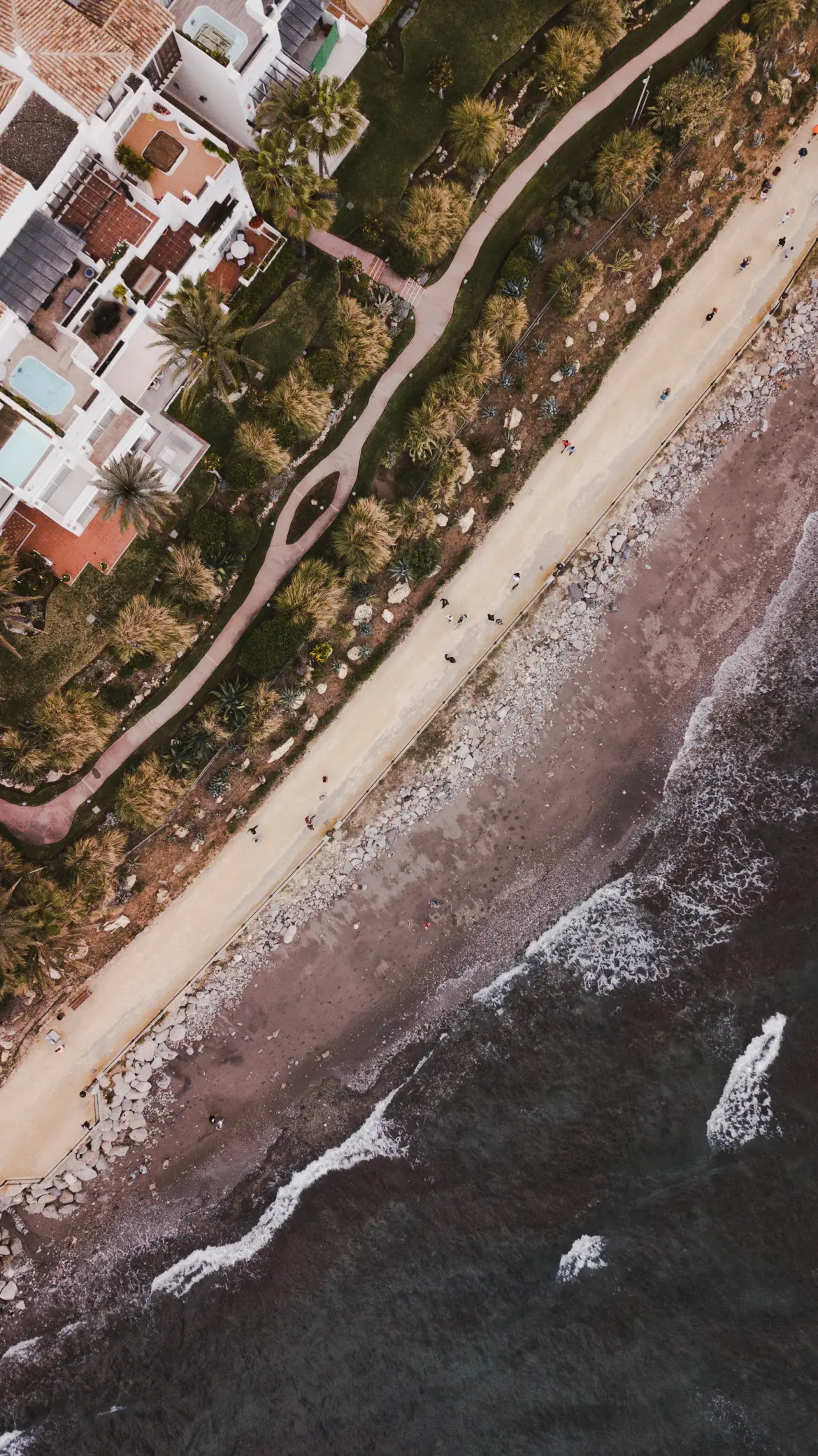
Huge Beach Regeneration Project as Spain Invests 8.5 Million Euros in Marbella’s Coastal Future
Natalia Tschurtschun | · 7 min. read
Spain has taken a significant step forward in coastal protection and sustainable tourism development with the approval of an ambitious 8.5 million euro beach regeneration project for Marbella. This landmark investment represents a comprehensive approach to preserving one of Europe's most beloved coastal destinations while setting new standards for environmental stewardship and tourism sustainability along the Mediterranean coast.
A Vision Realized: Years of Planning Come to Fruition
The Spanish Ministry for Ecological Transition and the Demographic Challenge (MITECO) has granted environmental approval for what represents one of the most sophisticated coastal protection initiatives on the Costa del Sol. The project includes the construction of two strategic dikes off the coast in Marbella, covering four beaches between La Venus and El Ancón, marking a fundamental step toward long-term coastal resilience.
This approval of the beach regeneration project culminates years of collaborative planning between local authorities, environmental scientists, and tourism stakeholders who recognized the urgent need for proactive coastal management. The project demonstrates Spain's commitment to balancing economic development with environmental protection, creating a model that other Mediterranean destinations can emulate.
Engineering Excellence for Environmental Protection
The approved coastal protection system represents cutting-edge marine engineering designed to work in harmony with natural coastal processes. The breakwater construction will strategically interrupt wave energy, reducing erosion while maintaining the natural beauty and accessibility that makes Marbella's beaches world-renowned.
The construction of dams facing the shore has already facilitated regeneration of sand areas that winter waves had eroded, ensuring perfect enjoyment of beaches stretching across 1,000 metres in length and 30 metres in width. This proven approach demonstrates how thoughtful engineering can enhance rather than diminish coastal environments.
The beach regeneration project's environmental impact assessment ensures that marine ecosystems will be protected throughout construction and operation. Modern breakwater design incorporates ecological considerations, creating new habitats for marine life while providing the coastal protection communities need.
Economic Catalyst for Sustainable Tourism
This substantial investment serves as a powerful economic catalyst for the entire Costa del Sol region. Coastal cities like Málaga are experiencing rising property values and continued appeal as lifestyle destinations, with increasing demand from international buyers, making coastal protection investments particularly valuable for long-term economic stability.

The project supports thousands of tourism-related jobs across the hospitality, recreation, and service sectors. By ensuring the long-term viability of Marbella's beaches, this investment protects employment for hotel workers, restaurant staff, beach service providers, and countless other professionals whose livelihoods depend on coastal tourism.
Beyond immediate employment impacts, the project enhances Marbella's competitive position in the global tourism market. The Costa del Sol has been a popular destination for foreign tourists since the 1950s, valued not only for its beaches but also for its local culture. This investment ensures these attractions remain accessible to future generations of visitors.
Environmental Leadership and Climate Adaptation
The Marbella beach regeneration project exemplifies Spain's leadership in climate adaptation and environmental stewardship. With nearly half of the global population living within 200 km of the coast, and projected statistics showing population growth could reach 70% by 2025, coastal protection has become a critical global priority.
The project incorporates best practices in sustainable coastal management, using materials and techniques that minimize environmental impact while maximizing protective benefits. This approach aligns with European Union environmental policies that aim to protect biodiversity while promoting sustainable development.
Spain's investment in coastal protection demonstrates forward-thinking environmental policy that addresses climate change challenges proactively rather than reactively. The project serves as a practical example of how nations can adapt to changing environmental conditions while maintaining economic vitality.
Innovation in Coastal Engineering
The approved breakwater system incorporates innovative design features that maximize effectiveness while minimizing visual and environmental impact. Modern coastal engineering has evolved significantly from traditional approaches, emphasizing integration with natural systems rather than opposition to them.
The project's design considers both immediate protection needs and long-term coastal evolution. By working with natural sediment transport processes rather than against them, the breakwaters will help maintain beach width and quality over decades, ensuring sustainable returns on the 8.5 million euro investment.
Advanced materials and construction techniques will ensure the structures can withstand extreme weather events while requiring minimal maintenance. This durability is crucial for protecting the long-term value of the investment and ensuring continuous coastal protection.
Regional Development and Infrastructure Enhancement
The beach regeneration project catalyzes broader regional development initiatives that enhance quality of life for residents and visitors alike. Major infrastructure investments in the Costa del Sol, including desalination facilities that will provide more than 20% of the region's annual water needs, demonstrate comprehensive planning for sustainable growth.
These coordinated infrastructure improvements create synergies that multiply the benefits of individual projects. Reliable water supply, coastal protection, and environmental stewardship combine to create an increasingly attractive destination for both tourists and permanent residents.
The project also supports Spain's broader economic diversification efforts, helping transition coastal regions toward high-value, sustainable tourism that can compete effectively in global markets while preserving environmental assets.
Community Benefits and Quality of Life
Local communities will experience immediate and long-term benefits from improved coastal protection. Residents gain peace of mind knowing their coastal assets are protected, while also enjoying enhanced recreational opportunities on more stable, accessible beaches.
The project's design prioritizes public access and enjoyment, ensuring that coastal protection enhances rather than restricts community use of beach areas. Marbella conserves all the charms of a typical Andalusian town while offering modern amenities, golf clubs, and recreational areas, and this investment supports that balanced approach to development.
Improved coastal stability also benefits local businesses, from beachfront restaurants to water sports operators, by providing more predictable operating conditions and reduced risk of storm damage.

International Recognition and Best Practices
The Marbella project positions Spain as a leader in coastal management best practices, attracting international attention and potential replication in other Mediterranean destinations facing similar challenges. This recognition enhances Spain's reputation as an innovative, environmentally conscious tourism destination.
The project's comprehensive approach, integrating environmental protection, economic development, and community benefits, provides a template for sustainable coastal development that other nations can adapt to their specific circumstances.
Technological Innovation and Research Opportunities
The project creates opportunities for ongoing research and technological development in coastal engineering and marine science. Universities and research institutions can study the breakwaters' performance, contributing to global knowledge about effective coastal protection strategies.
Monitoring systems installed as part of the project will provide valuable data about coastal processes, wave dynamics, and ecosystem responses that can inform future coastal management decisions throughout Spain and beyond.
Future-Proofing Coastal Communities
Perhaps most importantly, this investment represents a commitment to future-proofing coastal communities against increasing environmental challenges. The Costa del Sol region is currently undergoing significant transformation, and this project ensures that transformation includes enhanced resilience and sustainability.
The 8.5 million euro investment demonstrates that proactive coastal protection is both economically sound and environmentally responsible. By acting before crisis conditions develop, Spain avoids much higher costs and more disruptive interventions that might be necessary without preventive measures.
A Model for Mediterranean Coastal Management
The Marbella beach regeneration project stands as a testament to Spain's commitment to sustainable coastal development and environmental stewardship. This 8.5 million euro investment protects economic assets worth hundreds of millions while preserving natural beauty for future generations.
The project's success will undoubtedly inspire similar initiatives throughout the Mediterranean region, establishing Spain as a leader in adaptive coastal management. For Marbella's residents, businesses, and millions of annual visitors, this investment ensures that one of Europe's premier coastal destinations will remain vibrant and accessible for decades to come.
Through thoughtful planning, innovative engineering, and substantial financial commitment, Spain has created a model for how nations can address coastal challenges while enhancing economic opportunity and environmental quality. The Marbella beach regeneration project represents not just an investment in infrastructure, but an investment in a sustainable coastal future.